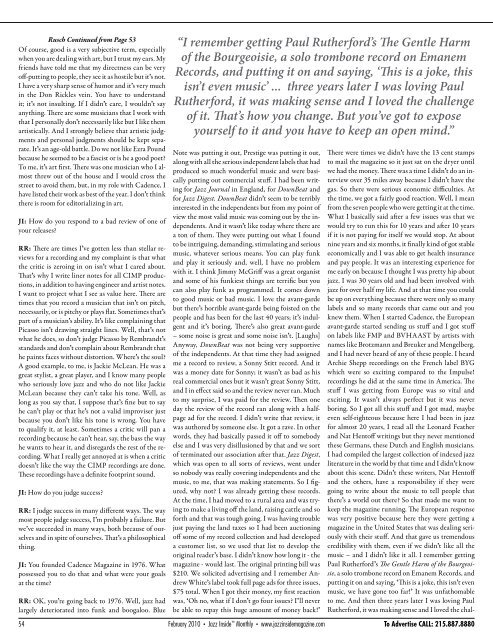February 2010 issue - Jazz Singers.com
February 2010 issue - Jazz Singers.com
February 2010 issue - Jazz Singers.com
Create successful ePaper yourself
Turn your PDF publications into a flip-book with our unique Google optimized e-Paper software.
Rusch Continued from Page 53 “I remember getting Paul Rutherford’s The Gentle Harm<br />
Of course, good is a very subjective term, especially<br />
when you are dealing with art, but I trust my ears. My<br />
friends have told me that my directness can be very<br />
off-putting to people, they see it as hostile but it’s not.<br />
I have a very sharp sense of humor and it’s very much<br />
in the Don Rickles vein. You have to understand<br />
it; it’s not insulting. If I didn’t care, I wouldn’t say<br />
anything. There are some musicians that I work with<br />
that I personally don’t necessarily like but I like them<br />
artistically. And I strongly believe that artistic judgments<br />
and personal judgments should be kept separate.<br />
It’s an age-old battle. Do we not like Ezra Pound<br />
because he seemed to be a fascist or is he a good poet?<br />
To me, it’s art first. There was one musician who I almost<br />
threw out of the house and I would cross the<br />
street to avoid them, but, in my role with Cadence, I<br />
have listed their work as best of the year. I don’t think<br />
there is room for editorializing in art.<br />
JI: How do you respond to a bad review of one of<br />
your releases?<br />
RR: There are times I’ve gotten less than stellar reviews<br />
for a recording and my <strong>com</strong>plaint is that what<br />
the critic is zeroing in on isn’t what I cared about.<br />
That’s why I write liner notes for all CIMP productions,<br />
in addition to having engineer and artist notes.<br />
I want to project what I see as value here. There are<br />
times that you record a musician that isn’t on pitch,<br />
necessarily, or is pitchy or plays flat. Sometimes that’s<br />
part of a musician’s ability. It’s like <strong>com</strong>plaining that<br />
Picasso isn’t drawing straight lines. Well, that’s not<br />
what he does, so don’t judge Picasso by Rembrandt’s<br />
standards and don’t <strong>com</strong>plain about Rembrandt that<br />
he paints faces without distortion. Where’s the soul?<br />
A good example, to me, is Jackie McLean. He was a<br />
great stylist, a great player, and I know many people<br />
who seriously love jazz and who do not like Jackie<br />
McLean because they can’t take his tone. Well, as<br />
long as you say that, I suppose that’s fine but to say<br />
he can’t play or that he’s not a valid improviser just<br />
because you don’t like his tone is wrong. You have<br />
to qualify it, at least. Sometimes a critic will pan a<br />
recording because he can’t hear, say, the bass the way<br />
he wants to hear it, and disregards the rest of the recording.<br />
What I really get annoyed at is when a critic<br />
doesn’t like the way the CIMP recordings are done.<br />
These recordings have a definite footprint sound.<br />
JI: How do you judge success?<br />
RR: I judge success in many different ways. The way<br />
most people judge success, I’m probably a failure. But<br />
we’ve succeeded in many ways, both because of ourselves<br />
and in spite of ourselves. That’s a philosophical<br />
thing.<br />
JI: You founded Cadence Magazine in 1976. What<br />
possessed you to do that and what were your goals<br />
at the time?<br />
RR: OK, you’re going back to 1976. Well, jazz had<br />
largely deteriorated into funk and boogaloo. Blue<br />
of the Bourgeoisie, a solo trombone record on Emanem<br />
Records, and putting it on and saying, ‘This is a joke, this<br />
isn’t even music’ ... three years later I was loving Paul<br />
Rutherford, it was making sense and I loved the challenge<br />
of it. That’s how you change. But you’ve got to expose<br />
yourself to it and you have to keep an open mind.”<br />
Note was putting it out, Prestige was putting it out,<br />
along with all the serious independent labels that had<br />
produced so much wonderful music and were basically<br />
putting out <strong>com</strong>mercial stuff. I had been writing<br />
for <strong>Jazz</strong> Journal in England, for DownBeat and<br />
for <strong>Jazz</strong> Digest. DownBeat didn’t seem to be terribly<br />
interested in the independents but from my point of<br />
view the most valid music was <strong>com</strong>ing out by the independents.<br />
And it wasn’t like today where there are<br />
a ton of them. They were putting out what I found<br />
to be intriguing, demanding, stimulating and serious<br />
music, whatever serious means. You can play funk<br />
and play it seriously and, well, I have no problem<br />
with it. I think Jimmy McGriff was a great organist<br />
and some of his funkiest things are terrific but you<br />
can also play funk as programmed. It <strong>com</strong>es down<br />
to good music or bad music. I love the avant-garde<br />
but there’s horrible avant-garde being foisted on the<br />
people and has been for the last 40 years; it’s indulgent<br />
and it’s boring. There’s also great avant-garde<br />
– some noise is great and some noise isn’t. [Laughs]<br />
Anyway, DownBeat was not being very supportive<br />
of the independents. At that time they had assigned<br />
me a record to review, a Sonny Stitt record. And it<br />
was a money date for Sonny; it wasn’t as bad as his<br />
real <strong>com</strong>mercial ones but it wasn’t great Sonny Stitt,<br />
and I in effect said so and the review never ran. Much<br />
to my surprise, I was paid for the review. Then one<br />
day the review of the record ran along with a halfpage<br />
ad for the record. I didn’t write that review, it<br />
was authored by someone else. It got a rave. In other<br />
words, they had basically passed it off to somebody<br />
else and I was very disillusioned by that and we sort<br />
of terminated our association after that. <strong>Jazz</strong> Digest,<br />
which was open to all sorts of reviews, went under<br />
so nobody was really covering independents and the<br />
music, to me, that was making statements. So I figured,<br />
why not? I was already getting these records.<br />
At the time, I had moved to a rural area and was trying<br />
to make a living off the land, raising cattle and so<br />
forth and that was tough going. I was having trouble<br />
just paying the land taxes so I had been auctioning<br />
off some of my record collection and had developed<br />
a customer list, so we used that list to develop the<br />
original reader’s base. I didn’t know how long it - the<br />
magazine - would last. The original printing bill was<br />
$210. We solicited advertising and I remember Andrew<br />
White’s label took full page ads for three <strong>issue</strong>s,<br />
$75 total. When I got their money, my first reaction<br />
was, ‘Oh no, what if I don’t go four <strong>issue</strong>s? I’ll never<br />
be able to repay this huge amount of money back!’<br />
There were times we didn’t have the 13 cent stamps<br />
to mail the magazine so it just sat on the dryer until<br />
we had the money. There was a time I didn’t do an interview<br />
over 35 miles away because I didn’t have the<br />
gas. So there were serious economic difficulties. At<br />
the time, we got a fairly good reaction. Well, I mean<br />
from the seven people who were getting it at the time.<br />
What I basically said after a few <strong>issue</strong>s was that we<br />
would try to run this for 10 years and after 10 years<br />
if it is not paying for itself we would stop. At about<br />
nine years and six months, it finally kind of got stable<br />
economically and I was able to get health insurance<br />
and pay people. It was an interesting experience for<br />
me early on because I thought I was pretty hip about<br />
jazz. I was 30 years old and had been involved with<br />
jazz for over half my life. And at that time you could<br />
be up on everything because there were only so many<br />
labels and so many records that came out and you<br />
knew them. When I started Cadence, the European<br />
avant-garde started sending us stuff and I got stuff<br />
on labels like FMP and BVHAAST by artists with<br />
names like Brotzmann and Breuker and Mengelberg,<br />
and I had never heard of any of these people. I heard<br />
Archie Shepp recordings on the French label BYG<br />
which were so exciting <strong>com</strong>pared to the Impulse!<br />
recordings he did at the same time in America. The<br />
stuff I was getting from Europe was so vital and<br />
exciting. It wasn’t always perfect but it was never<br />
boring. So I got all this stuff and I got mad, maybe<br />
even self-righteous because here I had been in jazz<br />
for almost 20 years, I read all the Leonard Feather<br />
and Nat Hentoff writings but they never mentioned<br />
these Germans, these Dutch and English musicians.<br />
I had <strong>com</strong>piled the largest collection of indexed jazz<br />
literature in the world by that time and I didn’t know<br />
about this scene. Didn’t these writers, Nat Hentoff<br />
and the others, have a responsibility if they were<br />
going to write about the music to tell people that<br />
there’s a world out there? So that made me want to<br />
keep the magazine running. The European response<br />
was very positive because here they were getting a<br />
magazine in the United States that was dealing seriously<br />
with their stuff. And that gave us tremendous<br />
credibility with them, even if we didn’t like all the<br />
music – and I didn’t like it all. I remember getting<br />
Paul Rutherford’s The Gentle Harm of the Bourgeoisie,<br />
a solo trombone record on Emanem Records, and<br />
putting it on and saying, ‘This is a joke, this isn’t even<br />
music, we have gone too far!’ It was unfathomable<br />
to me. And then three years later I was loving Paul<br />
Rutherford, it was making sense and I loved the chal-<br />
54 <strong>February</strong> <strong>2010</strong> • <strong>Jazz</strong> Inside Monthly • www.jazzinsidemagazine.<strong>com</strong> To Advertise CALL: 215.887.8880




